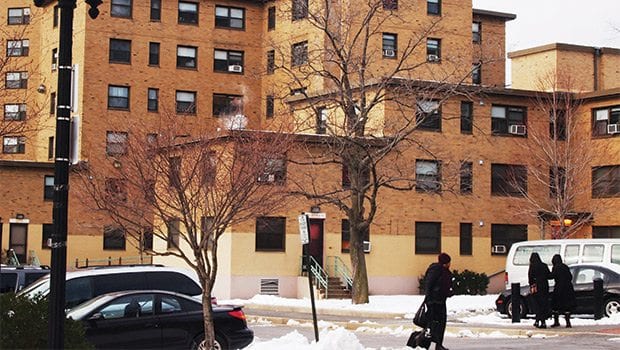Trump administration draft budget calls for $6 billion Housing and Urban Development cut
Cuts are seen as part of long-term plan to de-fund public housing, benefits programs

When President Donald Trump appointed neurosurgeon and former presidential candidate Ben Carson to head the federal Department of Housing and Urban Development, many questioned his commitment to the public housing and community development programs funded by the agency.
The selection of Carson, who has spoken out against public benefits programs, was seen by many as a lack of commitment to HUD. Last week, the Trump administration’s draft HUD budget leaked to the press showed a $6 billion cut to its $48 billion budget.
That cut would force the agency to stop funding maintenance and repairs. It would also curtail it from maintaining its voucher program in the face of rising housing costs, according to Boston Housing Authority Administrator Bill McGonagle.
“We have 41,000 families on our waiting list,” he said. “We can only accept 600 families a year due to turnover. And that’s at current funding levels.”
McGonagle, who said the proposal coming from the Trump administration’s Office of Management and Budget would be a disaster in terms of the BHA’s ability to maintain its units.
“We could not even remotely meet our core mission of decent, safe and sanitary housing,” he said.
Cuts to HUD would not be limited to the BHA budget. Other city departments rely on HUD funding for programs including homelessness prevention, first-time homebuyer assistance, small business assistance and brownfields environmental clean ups. Much of HUD’s funding comes in the form of community development block grants, which allow cities and towns more discretion in how it’s used.
“It’s a very flexible source of funding,” said Department of Neighborhood Development Director Sheila Dillon.
Over the years, Republicans have been steadily chipping away at the HUD budget, cutting $1 billion from the agency’s capital improvement budget between 2000 and 2016. Those cuts have hit cities like Boston hard and forced some to tear down public housing developments they are unable to adequately maintain. The Boston Housing Authority has turned to nonprofit and for-profit real estate developers to take over administration of its properties and perform various maintenance projects.
“We’re trying to do some rather creative, outside-the-box things for our elder federal housing developments,” McGonagle said.
Long range plan?
The latest budget, hatched by arch-conservative OMB Director Mick Mulvaney, is seen by many as the logical extension of the anti-government doctrine articulated by the right-wing Heritage Foundation think tank.
“This is consistent with what the Heritage Foundation is calling for in its ten-year plan to eliminate HUD,” said Michael Kane, executive director of the National Alliance of HUD Tenants.
Coupled with the administration’s planned $57 billion hike in military spending and cuts to anti-poverty programs — also in line with Heritage Foundation recommendations — Mulvaney’s recommendations constitute a threat to working class people, Kane said.
“It’s a death budget,” he commented. “Increasing military spending, destroying programs that keep people healthy, defunding Medicaid — people will die from these budget cuts.”
In Boston, as in many major urban areas in the United States, housing costs are outpacing rental subsidies, forcing low-income workers to pay a greater share of their income on rent. The gradual erosion of the HUD budget, which began during the 1990s, has exacerbated the pressure on public housing waitlists, according to McGonagle.
“Seventy-five percent of the folks who are income-eligible for Section 8 housing are on waiting lists,” he said. “If anything, the federal government should be investing more.”
McGonagle says the cuts to the HUD budget, if enacted, would force his agency to zero out its capital budget, which pays for repairs, in addition to cutting deeply into funds for the day-to-day operation of public housing developments.
“It thoroughly cuts the operating budget that was already weakened during sequestration,” he said, referring to federal budget cuts in 2013 and 2014.
In a message to HUD staff, Carson said the budget advanced by Mulvaney is preliminary, and pledged to work to maintain adequate HUD funding.
McGonagle noted that Carson made a similar pledge during his confirmation hearings.
“This is an opportunity for Carson to stand up and do what he said he’d do to defend public housing,” he said. “I’m hopeful, if not optimistic, that he will do that.”
Dillon said she and city officials from across the country are working to pressure the Trump administration to maintain HUD funding.
“It’s a new administration,” she said. “Boston and other cities are working together to let the new administration know the importance of community development block grants and what they’re used for. We’re trying to educate the new administration.”






